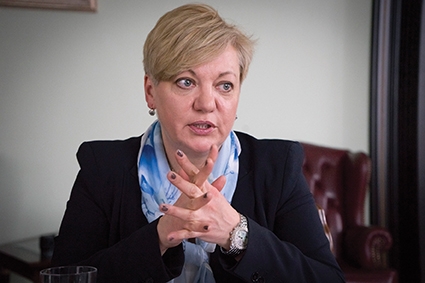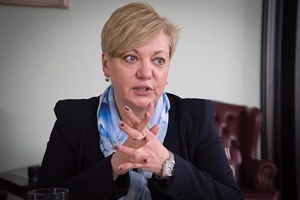Kleptocrats Attack Ukraine’s Reform-Minded Central Banker
Since the ouster of former President Viktor Yanukovych in 2014, Ukraine has been pulled in two directions. Wealthy elites have rejected reform while technocrats have fought corruption. A major player on the reform side is the central bank, the National Bank of Ukraine, and its leader, Valeriya Gontareva.
In recent months, both the bank and Gontareva have come under increasingly fierce and unfair attack from the elites. The pressure is likely to get even more intense now that the nation’s largest commercial lender, PrivatBank, has been nationalized, replacing two influential business executives with 100 percent control by the State.
Ukraine’s well-connected oligarchs have looted the country’s banking sector and defrauded ordinary Ukrainians. During Yanukovych’s administration (2010 to 2014), banks owned by local oligarchic groups operated with virtually no restrictions. They took in billions from individual depositors and funneled the money as loans to the banks’ owners, their cronies and shell companies. Most of these loans were not repaid, resulting in an estimated USD 12 billion loss to the state and depositors, according to Ukraine's Deposit Guarantee Fund.
Yanukovych’s corrupt Tsar-like rule of the country and shameful escape left Ukraine fighting Russian aggression and dealt an unprecedented blow to the value of the hryvnia, Ukraine’s currency. It has never recovered.
Yet Ukraine’s reformers continue to press forward. The central bank has been the most influential driver of change. Since taking the reins two years ago, Gontareva has closed nearly 90 insolvent banks, half of the total in Ukraine, in order to clean up the system of “zombie banks” engaged in related-party lending and money laundering, and to recover at least some of the depositors’ assets.
Thanks to a responsible monetary policy, Gontareva and the central bank have stabilized the hryvnia and increased the country’s foreign reserves from an all-time low of USD 5 billion in February 2015 to USD 16 billion today. Ukraine’s 12 biggest banks have rallied in support of Gontareva’s actions. Internationally, the National Bank of Ukraine has been hailed as a standout success story in reforming the country’s financial sector. It has received support from the International Monetary Fund, the European Union and the European Bank for Reconstruction and Development.
Inflation in Ukraine has fallen from a staggering 61% to 8%. But not everyone is happy. Nearly half the nation’s richest business executives have lost their so-called pocket banks and their access to easy cash, i.e. ordinary Ukrainians’ deposits.
For many of Ukraine’s old guard, this was the final straw. On October 10, several members of Parliament submitted a draft law that would effectively strip the central bank of its independence and remove Gontareva.
In Parliament, Gontareva’s opponents are easily identifiable: Chairman of the Radical Party Oleh Lyashko and Deputy Chairman of the Radical Party Viktor Galasiuk sponsored the draft law. In a mocking gesture, when Ukrainian officials were asked to make public their incomes and assets, Lyashko listed one pitchfork, along with a bounty of real estate assets and close to USD 1 million in cash. While both Lyashko and Galasiuk claim the draft law was born out of populism, it is in fact a thinly veiled attempt to weaken the central bank and strengthen the hand of the kleptocracy. Veteran observers of Ukraine understand that Lyashko and Galasiuk are the front men for this assault on the central bank’s freedom, with longtime political opponents Yulia Tymoshenko and Ihor Kolomoyskyi working behind the scenes to maintain the regime of corruption.
The independence of the National Bank is of the utmost importance; aid from the IMF, for example, is contingent on it. Any move to limit the National Bank’s independence would likely end western financial aid and risk Ukraine’s relations with its creditors.
It’s clear that Ukraine’s financial sector demands immediate attention and reform. But it is also apparent that Ukraine’s class of oligarchs will fight the necessary change at every turn. Unfortunately, the obstinacy of the elite can often escalate from rhetoric to genuine threats of physical harm. Ukraine can be the European equivalent of the Wild West. And when those threats are directed at a specific individual like Gontareva, one can be sure it is because her reforms are making it harder for the corrupt oligarchs to continue looting the country.
For Ukraine to emerge as a prosperous nation, Western-style reform is needed. The best vehicle for reform at this stage is the National Bank under Gontareva’s leadership.
Ukrainians must resist the temptation to fall back to the status-quo of accepting post-communist corruption. The elite will defend many of the financial issues that hit their bank accounts as populism. But the interests of the people lie with the reformers who are striving to rid the economy of debilitating cronyism.
Eugen Iladi











